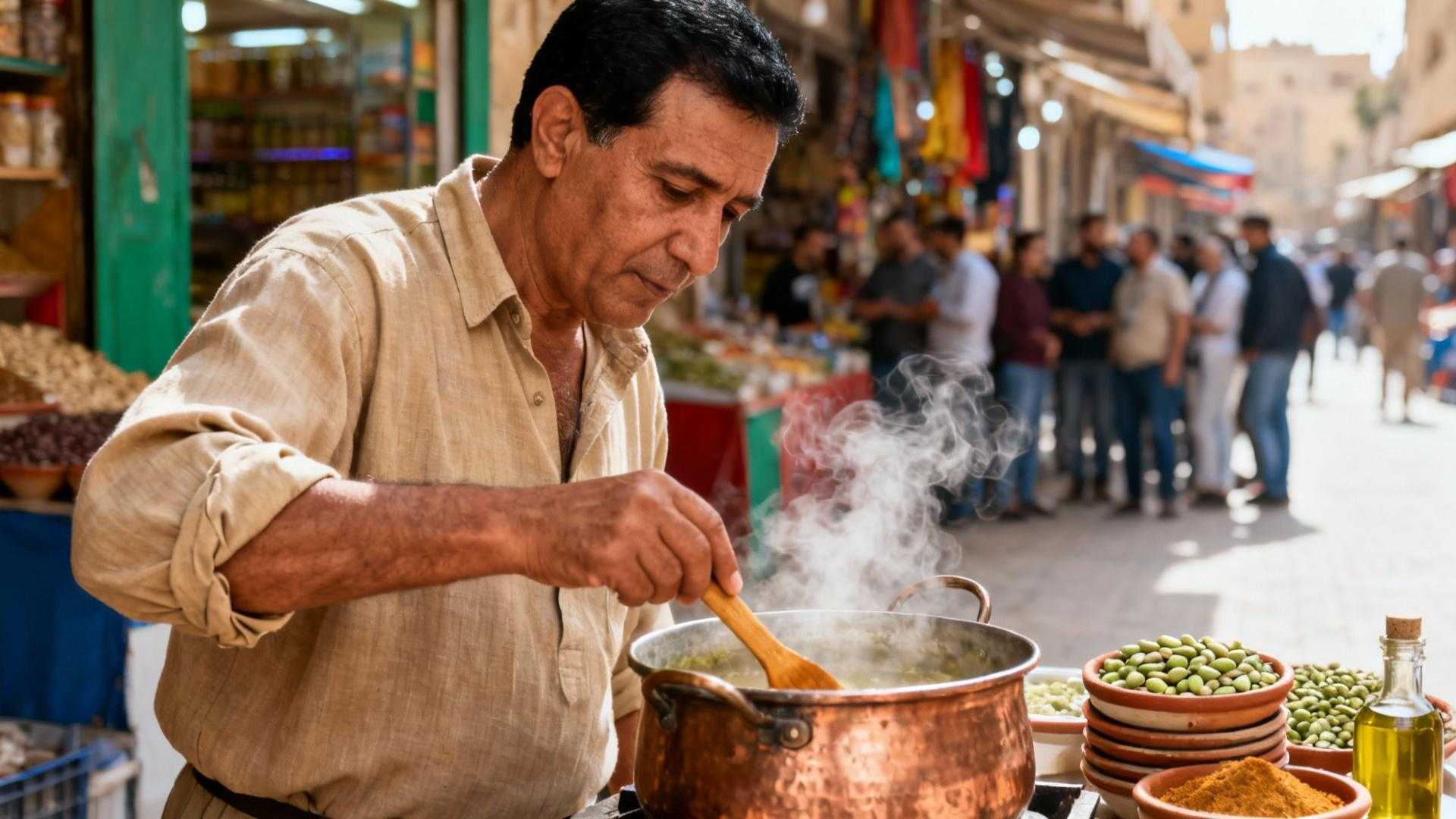At 5:30 AM, the call to prayer echoes across Islamic Cairo while tour buses sit empty. A shopkeeper unlocks metal shutters at Khan el-Khalili. A grandmother carries fresh baladi bread wrapped in newspaper.
This is the Cairo that 10 million residents protect. The 150-minute window before 8 AM when authentic Egyptian life unfolds in rituals unchanged for centuries.
No pyramid queues, no camel photo ops. Just the Islamic capital’s morning choreography that tourists sleeping until breakfast buffets never witness.
The Pre-Dawn Market Symphony Cairo Guards
Souq el-Gom’aa awakens before sunrise. Vendors arrange produce by candlelight while diesel smoke mixes with Nile humidity.
Street sweepers with palm-frond brooms clean cobblestones. Coffee cart owners prepare first ahwa batches for the day ahead.
The unspoken market hierarchy emerges. Regulars get first choice of tomatoes and okra before tourists arrive at 8 AM.
Wholesale prices drop 30% from midday tourist rates. Morning vendors in Havana follow similar patterns, protecting authentic pricing for locals.
What Happens Between Fajr Prayer and Tourist Arrival
The spiritual rhythm governs Cairo’s morning. Fajr prayer begins at 5:15 AM in October.
Three generations gather around wooden tables. Breakfast becomes a sacred ritual before work and school dispersal at 7:30 AM.
The 5:15 AM Mosque Routine Tourists Never See
Ablution fountains fill with worshippers. Prayer mats arrange in perfect rows facing Mecca.
Post-prayer tea circles form where neighborhood news spreads. Seoul’s morning temple gatherings share this community bond across cultures.
How Cairo’s 1,000-Year Breakfast Culture Survives
Ful medames carts open at 5:45 AM. Ta’ameya fries in century-old copper pots on sidewalk corners.
Strangers share tables without introduction. The sidewalk breakfast ritual creates temporary families before the day scatters them.
The Neighborhood Corners Where Cairo Actually Eats
Government-subsidized bakeries create 5:30 AM queues. Bread stays warm wrapped in Arabic newspapers.
The social contract of morning bread distribution operates on trust. No cashiers, just honor systems and neighborhood accountability.
Koshary Abou Tarek’s 7 AM Counter in Downtown
Koshary Abou Tarek opens at 7:00 AM daily on Champollion Road. Four generations have served Egypt’s national dish since the 1950s.
Taxi drivers and lawyers eat elbow-to-elbow. Wooden stools remain unchanged since founding decades ago.
A plate costs 60 Egyptian pounds. Cultural etiquette rules apply just like sacred spaces elsewhere.
The Baladi Bread Economy Before Giza Opens
Government subsidies keep prices at 5 piasters per loaf. Queues form before dawn for fresh rounds.
Bakery workers arrive at 4 AM to fire ovens. The bread economy runs on precise timing and community respect.
Why Cairenes Finish Their Day Before Yours Starts
Summer heat reaches 34°C by noon. Dawn productivity follows Islamic concepts of baraka blessing early hours.
Three generations gather for family breakfast before dispersal at 7:30 AM. Western hotel buffets commercialized this into lonely individual plates.
Marrakech follows similar patterns of protecting family breakfast time from tourism pressure.
Your Questions About Cairo’s Morning Culture Answered
What time should I wake up to see authentic Cairo?
5:15 AM for mosque calls. 5:45 AM for market opening. 6:30 AM for breakfast crowds.
Before 8 AM, pyramid tour machinery activates and authentic rhythms fade into tourist schedules.
Can tourists join these morning routines respectfully?
Yes, with preparation. Dress modestly covering arms and legs. Learn basic Arabic greetings like sabah el-kheir.
Avoid photography during prayer times. Order food like locals by pointing rather than photographing menus.
How does Cairo’s morning ritual differ from Marrakech?
Cairo’s Islamic prayer schedule creates more rigid timing. Breakfast focuses on savory dishes versus Marrakech’s sweet msemen.
Markets open 45 minutes earlier due to eastern sunrise position. Government bread subsidies create different queue dynamics.
At 7:58 AM, the last neighborhood breakfast cart closes as tour buses rumble toward Giza. The morning ritual Cairenes perfected across 1,000 years dissolves into midday heat.
